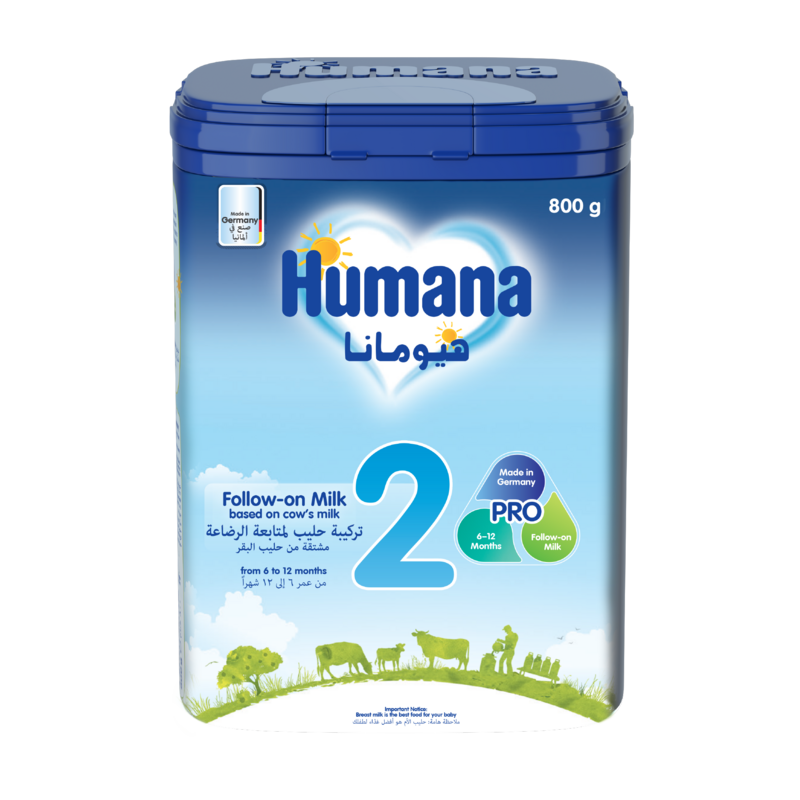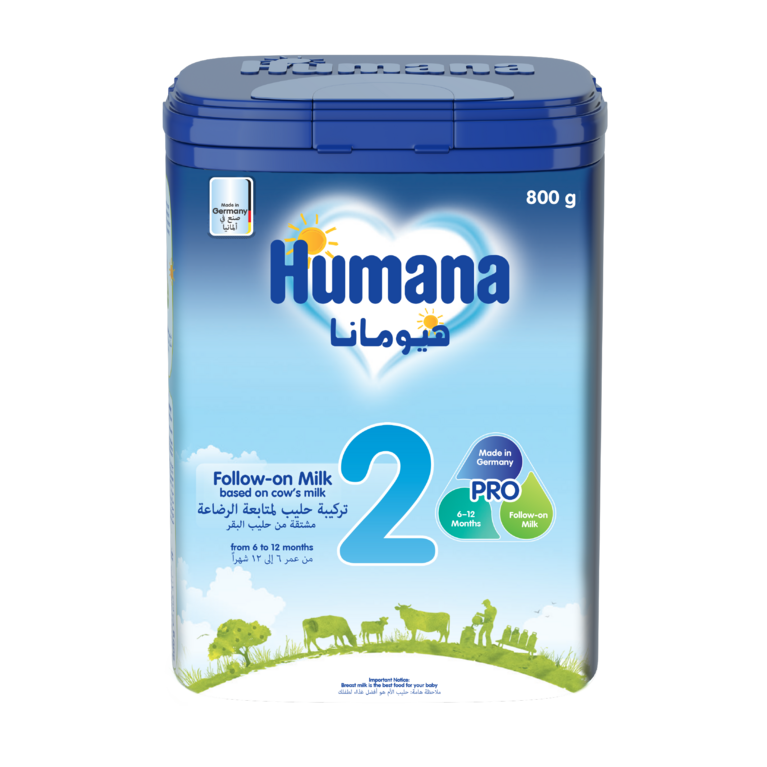Humana 1
Our infant milk for babies from birth onwards

Our Humana 2 follow-on milk is ideally suited for the weaning age, after 6 months as part of a balanced diet, to support your baby’s growth and development.
Your baby is growing day by day, becoming more active and starting to explore solid food. Our Humana 2 contains lactose only as its sole source of carbohydrates and to support your baby’s growth path, our baby milk is enriched with all essential nutrients in age-adapted amounts:
Intake contributes to the normal visual development of infants up to 12 months of age (beneficial effect is obtained with a daily intake of 100 mg DHA)
Fibres
An essential omega-3 fatty acid to support your baby’s cognitive development
Important for the immune system
Nucleotides
Your baby is growing day by day, becoming more active and starting to explore solid food. Our Humana 2 contains lactose only as its sole source of carbohydrates and to support your baby’s growth path, our baby milk is enriched with all essential nutrients in age-adapted amounts:
Intake contributes to the normal visual development of infants up to 12 months of age (beneficial effect is obtained with a daily intake of 100 mg DHA)
Fibres
An essential omega-3 fatty acid to support your baby’s cognitive development
Important for the immune system
Nucleotides

Life with a baby: An interplay between fulfillment and being overhelmed. The hardest and at the same time most wonderful task of my life. Good to have Humana by my side.
Humana 2 is ideally suited to supplement the weaning diet when your baby starts to explore solid food.
Our high-quality baby milks are produced in our new factory located in northern Germany.

Our most convenient & safest pack:
We are moved by latest insights from nature & science to offer baby nutrition with more than 65 years of experience.

Please use only the Humana measuring spoon included in our pack (holds about 4.5 g). After 6 months a baby drinks 200 ml per meal on average and 2-3 baby milk portions per day. The indicated drinking amounts are an approximate value and can vary individually as every baby is unique.
When preparing the baby milk, please follow the instructions. Clean bottle, teat and ring thoroughly, prepare freshly before each meal, feed immediately, and do not reuse any leftovers. Improper preparation and storage may be harmful to baby’s health.
Demineralised whey powder, Vegetable oil (palm, rapeseed, sunflower), skimmed milk powder, Lactose, Palm kernel fat, Potassium chloride, Calcium salts of orthophosphoric acid, Sodium citrate, Calcium carbonate, Oil from the microalgae Schizochytrium sp., Magnesium carbonate, L-Phenylalanine,L-Tryptophan, L-Tyrosine, Vitamin C, Potassium citrate, Nucleotides (Cytidine 5’-monophosphoric acid, Sodium salts of uridine 5’-phosphoric acid, Adenosine 5’-phosphoric acid, Sodium salts of inosine 5’-phosphoric acid, Sodium salts of guanosine 5’-phosphoric acid), Taurine, Ferrous bisglycinate, Zinc sulphate, Vitamin E, Niacin, Pantothenic acid, Cupric sulphate, Biotin, Thiamin, Manganese sulphate, Vitamin D, Vitamin A, Vitamin B6, Riboflavin, Potassium iodate, Folic acid, Vitamin K, Sodium selenate, Vitamin B12.
Of course, there is nothing better for your baby than your breast milk, but for various reasons, sometimes breastfeeding is simply not possible. Follow-on milk should not be used as a replacement for breast milk during the first 6 months, and should only be introduced after 6 months as part of a balanced diet.
The individual growth and development of your baby may make it necessary to introduce follow-on formula as part of a balanced diet earlier. Please talk to your pediatrician or your midwife if you want to use baby milk.